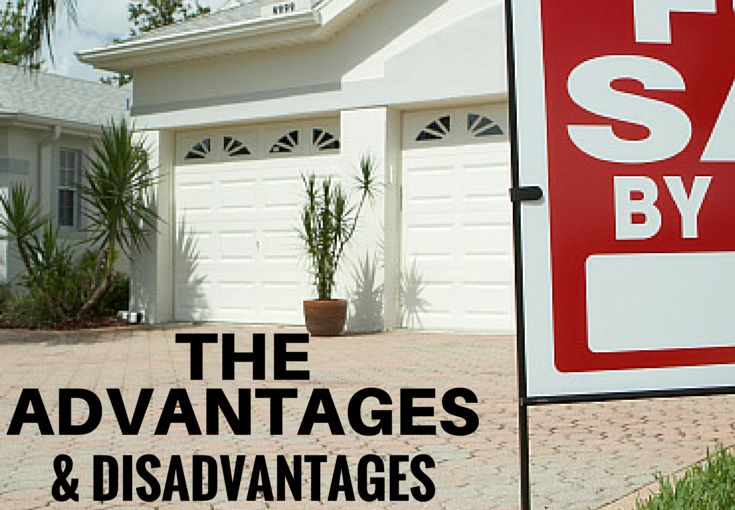If you’re considering making an offer on a Wilmington For Sale by Owner (FSBO), you should first understand why a homeowner would want to handle the sale of their own home. Basically, they want to save money, and they feel they can do that by not paying the average 6% commission rate (split between the seller’s and buyer’s agent) that sellers usually pay listing with a Realtor®. With that said, you’d likely be required to pay a Realtor’s commission if you wanted to use one, unless the homeowner is willing to pay at least the buyer side’s commission (3% of the purchase price on average).
But let’s say you decide to handle purchasing a FSBO alone. It’s important to your well being to know what to expect. It might be a lot more work and risk than you’re willing to take, or you may find you feel you’re completely comfortable with handling the whole process. Either way, here are some advantages and disadvantages to take into consideration.
Advantages
- You may get a deal.
According to the National Association of Realtors®, on average, FSBOs sell for 11% under market value. Most homeowners lack the experience and market knowledge to price their home correctly. They either under price their home at the start or they over price it so much that the home sits there until they’re forced to do some major price cutting to unload it. They also generally lack the negotiating skills needed to get a maximum price for their home. This works out in favor of the buyer.
- You can get creative with the offer.
Bartering and home swapping are all examples of creative negotiating with FSBOs. The majority of homeowners are not open to these options, because they would rather have a clean cash or loan deal, but it doesn’t mean it doesn’t happen.
- The homeowner has a thorough knowledge of the home (usually).
Unless they have never lived in the home, an owner can give you detailed information about the neighborhood, neighbors, and any benefits of living there. When a home is sold through a Realtor®, these details are usually provided through third-party means, like web sites, Realtor® knowledge, and speaking with neighbors.
The homeowners also know the home’s quirks and what repairs need to be made. Legally, if they sell through a Realtor® or not, they’re required to share any issues they’re aware of through a disclosure form, but they may be willing to take the extra steps to meet with you and go over them in person. They can show you how to work appliances and hardware, and give you special insight on the land.
Disadvantages
- You won’t have the experience of a Realtor®.
Realtors® go through hours and hours of training to make themselves knowledgeable on current real estate laws. A Realtor® will know what needs to be done to protect your interests, including your rights as a buyer, area changes that could affect your investment (like street and neighborhood improvements), and steps you can take to protect yourself in the future. You can’t guarantee that the homeowner knows exactly what they’re doing or sharing all the information they’re required to, because, at the end of the day, the homeowner has their best interests at heart, not yours. If the necessary precautions aren’t taken, the seller could return later and sue you for anything they feel is a wrongdoing. But a Realtor knows the whole process inside and out, and it’s their job to protect your interests.
- The homeowner may be difficult to negotiate with.
The benefit of having a third-party doing the negotiating is that emotion is removed from the equation. More often than not, a homeowner’s mind becomes clouded to the true value of their home. After all, they don’t just have a financial investment, but an emotional one that’s either attached to their memories of living there or what the money from the sale will be put toward. They can be more sensitive to critiques, including requested repairs. So, the negotiating process could take longer than normal and may require great patience on your part.
- The homeowner might not disclose all information.
Legally, a homeowner must provide a disclosure to the potential buyer before the contract is finalized. However, the homeowner may intentionally or unintentionally leave out information to push the sale through. This can be especially damaging if you do not take the necessary precautions to have the home inspected prior to the sale.
- You need to factor in the costs of hiring professionals to help the process along.
This is even more important if you haven’t hired a Realtor®, because you need to take extra steps to assure you’re making a sound investment. So, make sure you have money set aside to hire an appraiser, contractors, inspectors (definitely pest and home, and structural if the home inspection reveals issues), etc., as well as the much needed real estate attorney. If these people aren’t hired, there’s a chance you could be left unprotected in the future and with repairs that could end up totaling more than the money you saved by buying a FSBO.
Overall, purchasing a For Sale by Owner home could save you money and be the best option for your personal situation, but you need to be ready to put in the extra effort, time, and steps needed to protect yourself and your investment, or you could end up getting more than you bargained for. If the owner or you are willing to pay a commission fee, consider using a Realtor®. You could save yourself a lot of time, stress, and money in the long run, just by having the extra expertise on your side.
If you have any questions about buying real estate in the Wilmington area, feel free to give us a call at 910.202.2546 or send us a message through out Contact page.



